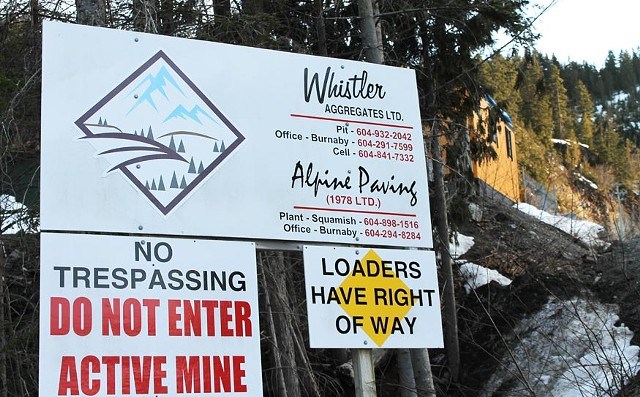The Resort Municipality of Whistler (RMOW) will continue obtaining asphalt locally, and stop air-quality monitoring at Cheakamus Crossing.
At the Feb. 20 council meeting, the RMOW’s manager of transportation and waste management, Andrew Tucker, recommended the municipality procure asphalt from Alpine Paving’s Cheakamus Crossing plant for 2024 and subsequent construction seasons, and that the ongoing air-quality monitoring program for particulate matter 2.5 be discontinued off the back of 13 years of data.
The RMOW began procuring asphalt from the Cheakamus location in 2020 and renewed in 2021, the rationale being a local source would reduce the environmental impact of transporting asphalt from Squamish or beyond to road construction efforts in Whistler. At the same time, the municipality installed additional air-quality monitoring infrastructure on top of monitoring established in 2010.
Tucker said the data collected indicates Cheakamus Crossing is below provincial thresholds for air quality, with the only spikes in particulates associated with wildfires and not the asphalt plant itself.
“The results are not indicating there’s any air-quality concerns related to the operation of the actual plant,” he said, adding securing product from Alpine Paving’s local facility lines up with the RMOW’s environmental goals.
“Procuring asphalt from a local supplier instead of driving it up the road (from Squamish) has environmental benefits… [and] the quality of asphalt we are getting is better, so it helps us in the long term in maintaining our roads,” Tucker said, explaining fresher asphalt is of a higher quality, making the works carried out using it more robust and longer-lasting.
Tucker added there is still air-quality monitoring infrastructure at Meadow Park Sports Centre, so there will still be monitoring within the RMOW by the provincial authorities.
During discussion, councillors unanimously approved procuring asphalt locally, but Councillor Cathy Jewett spoke against discontinuing air-quality monitoring in Cheakamus Crossing.
“I would like to keep this air-quality monitoring in place, and I think it’s useful for the people that live there,” she said.
“Cheakamus Crossing has a sewage treatment plant and an asphalt plant… plus it has Function Junction, which is industrial, and most of the traffic coming to the valley comes through there. I would like to support keeping air-quality monitoring.”
Coun. Jeff Murl pulled up the numbers, saying the data collected doesn’t support continuing the program given the cost.
“If three years of (intensive) monitoring shows no anomalies, I’m not sure what another three years will achieve … I don’t think spending $60,000 to reinforce the data set you already have is money well spent,” he said.
Mayor Jack Crompton said he felt the same way, adding the money that would be spent on continuing the monitoring is money that isn’t being spent on parks and improving the neighbourhood.
When it was called to a vote, while Coun. Jen Ford concurred with Jewett’s comments, saying it was good transparency for the community, she did not oppose the staff recommendation, leaving Jewett as the only councillor to vote against discontinuing the monitoring.
The cost of the air-quality monitoring program at Cheakamus Crossing in 2023 was a little under $60,000.




